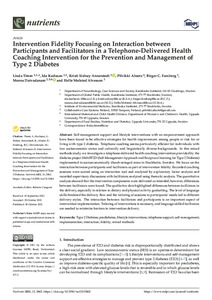Intervention Fidelity Focusing on Interaction between Participants and Facilitators in a Telephone-Delivered Health Coaching Intervention for the Prevention and Management of Type 2 Diabetes
Timm, Linda; Karlsson, Ida; Sidney Annerstedt, Kristi; Absetz, Pilvikki; Forsberg, Birger C; Daivadanam, Meena; Mølsted Alvesson, Helle (2021-10-28)
Timm, Linda
Karlsson, Ida
Sidney Annerstedt, Kristi
Absetz, Pilvikki
Forsberg, Birger C
Daivadanam, Meena
Mølsted Alvesson, Helle
28.10.2021
3862
Julkaisun pysyvä osoite on
https://urn.fi/URN:NBN:fi:tuni-202201221530
https://urn.fi/URN:NBN:fi:tuni-202201221530
Kuvaus
Peer reviewed
Tiivistelmä
Self-management support and lifestyle interventions with an empowerment approach have been found to be effective strategies for health improvement among people at risk for or living with type 2 diabetes. Telephone coaching seems particularly efficient for individuals with low socioeconomic status and culturally and linguistically diverse backgrounds. In this mixed methods study, we investigate a telephone-delivered health coaching intervention provided by the diabetes project SMART2D (Self-Management Approach and Reciprocal learning for Type 2 Diabetes) implemented in socioeconomically disadvantaged areas in Stockholm, Sweden. We focus on the interaction between participants and facilitators as part of intervention fidelity. Recorded coaching sessions were scored using an interaction tool and analyzed by exploratory factor analysis and recorded supervisory discussions with facilitators analyzed using thematic analysis. The quantitative analysis showed that the intervention components were delivered as intended; however, differences between facilitators were found. The qualitative data highlighted differences between facilitators in the delivery, especially in relation to dietary and physical activity goalsetting. The level of language skills hindered the delivery flow and the tailoring of sessions to participants' needs led to different delivery styles. The interaction between facilitators and participants is an important aspect of intervention implementation. Tailoring of interventions is necessary, and language-skilled facilitators are needed to minimize barriers in intervention delivery.
Kokoelmat
- TUNICRIS-julkaisut [16977]
